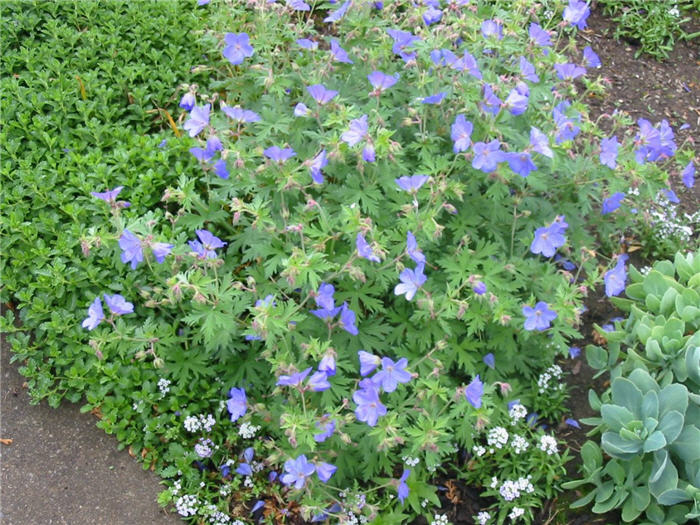| Botanical Name: Geranium x 'Johnson's Blue' | |
| Common Name: Johnson's Blue Cranesbill |

-
Anatomy
-
Culture
-
Design
Plant Type
Ground cover, Perennial
Height Range
1-3'
Flower Color
Blue, Lavender
Flower Season
Spring, Summer
Leaf Color
Green
Bark Color
n/a
Fruit Color
n/a
Fruit Season
n/a
Sun
Full, Half
Water
Low, Medium
Growth Rate
Moderate
Soil Type
Sandy, Clay, Loam, Rocky, Unparticular
Soil Condition
Average, Rich, Poor, Well-drained, Dry
Soil pH
Neutral, Basic
Adverse Factors
n/a
Design Styles
English Cottage, Meadow, Mediterranean, Ranch, Spanish, Woodland
Accenting Features
Fall Color, Showy Flowers
Seasonal Interest
Spring, Summer, Fall
Location Uses
Entry, Perennial Border, Shrub Border, Foundation, Parking Strip, Walls / Fences, Walkways
Special Uses
Mass Planting, Small Spaces
Attracts Wildlife
n/a
Information by: Stephanie Duer
Photographer:
Photographer:
-
Description
-
Notes
Johnson Blue geranium is a mounding, creeping, weaving perennial that grows 15 to 18 inches tall and 2 to 3 feet wide. Foliage is deeply lobed, nearly segmented, and is soft green and slightly hairy. Fall leaf color is crimson to purple. Its flowers, while not true blue, are a lovely periwinkle blue with a violet eye, five-petaled, and seem to bloom from late spring to fall. It has a tendency to weave in and around other perennials creating a lovely ground cover. Use in borders, rock gardens, or at the feet of taller shrubs and ornamental grasses.
Grow in well drained soil of nearly any type, in full sun to part shade. It can be sheared back after flowering to give it a tidier appearance, but it isn't necessary. The best time to cut back the foliage is in late winter to early spring, before new foliage emerges. Perennial geraniums, the true geranium, are not related to the fun-loving, annual plant commonly called "geranium" - those are pelargoniums.